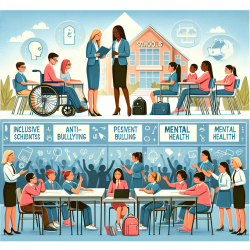Introduction to Social Psychiatry in Schools
In today's educational landscape, understanding the social aspects of mental health is crucial for fostering a supportive learning environment. The research article, Learning Social Psychiatry in the Medical School by E. B. Brody, highlights the importance of integrating social psychiatry into educational settings. At TinyEYE, we are committed to using data-driven approaches to improve outcomes for children, and this research offers valuable insights for practitioners.
Key Findings from the Research
The study emphasizes the role of social psychiatry in understanding the complex interplay between social environments and mental health. Here are some key takeaways:
- Holistic Approach: Social psychiatry encourages a comprehensive view of mental health, considering factors such as family dynamics, community influences, and cultural contexts.
- Interdisciplinary Collaboration: The research advocates for collaboration between educators, mental health professionals, and families to address the diverse needs of students.
- Preventive Strategies: Implementing preventive measures can mitigate potential mental health issues, promoting resilience and well-being among students.
Practical Applications for Practitioners
Practitioners can leverage these insights to enhance their therapeutic practices in school settings:
- Integrate Social Contexts: Consider the broader social factors affecting a child's mental health during assessments and interventions.
- Foster Collaborative Efforts: Work closely with teachers, parents, and other stakeholders to create a supportive network for students.
- Focus on Prevention: Develop programs that promote social-emotional learning and resilience to prevent mental health challenges.
Encouraging Further Research
While the study provides a strong foundation, ongoing research is essential to adapt these principles to the ever-evolving educational landscape. Practitioners are encouraged to stay informed about new developments in social psychiatry and contribute to the body of knowledge through their own research and practice.
Conclusion
Integrating social psychiatry into school-based therapy can significantly enhance the support provided to students. By understanding and addressing the social determinants of mental health, practitioners can create more effective and compassionate interventions. To delve deeper into the research, please read the original paper: Learning social psychiatry in the medical school.










